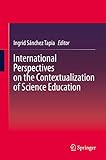International Perspectives on the Contextualization of Science Education [electronic resource] / edited by Ingrid Sánchez Tapia.
Material type: TextPublisher: Cham : Springer International Publishing : Imprint: Springer, 2020Edition: 1st ed. 2020Description: VI, 183 p. 26 illus. online resourceContent type: text Media type: computer Carrier type: online resourceISBN: 9783030279820Subject(s): Science education | Learning | Instruction | Curriculums (Courses of study) | Education—Curricula | Educational sociology | Educational policy | Education and state | Science Education | Learning & Instruction | Curriculum Studies | Sociology of Education | Educational Policy and PoliticsAdditional physical formats: Printed edition:: No title; Printed edition:: No title; Printed edition:: No titleDDC classification: 507.1 LOC classification: LC8-6691Online resources: Click here to access online
TextPublisher: Cham : Springer International Publishing : Imprint: Springer, 2020Edition: 1st ed. 2020Description: VI, 183 p. 26 illus. online resourceContent type: text Media type: computer Carrier type: online resourceISBN: 9783030279820Subject(s): Science education | Learning | Instruction | Curriculums (Courses of study) | Education—Curricula | Educational sociology | Educational policy | Education and state | Science Education | Learning & Instruction | Curriculum Studies | Sociology of Education | Educational Policy and PoliticsAdditional physical formats: Printed edition:: No title; Printed edition:: No title; Printed edition:: No titleDDC classification: 507.1 LOC classification: LC8-6691Online resources: Click here to access online I. Introduction -- II. Promoting student engagement: A Case Study of a Middle School Science Teacher Making Sense of the NGSS through Contextualization -- III. Critical contextualization: Confronting the root causes of inequity in science education through the curriculum -- IV. What to Eat Here and Now: Contextualization of Scientific Argumentation from a Place-based Perspective -- V. Framing, adapting, and applying: How can novice science teachers construct authentic science learning contexts for/with students in multilingual science classrooms? -- VI. Curricular Contextualization as a Strategy to Support Indigenous Students to Learn about Natural Selection -- VII. Border-crossing experiences of indigenous students learning science with a contextualized science unit -- VIII. Contextualization of assessment items for physics education -- IX. A Critical Review of the Chapters from a Researcher’s Perspective -- X. A Critical Review of the Chapters from a Teacher’s Perspective.
This book explores how science learning can be more relevant and interesting for students and teachers by using a contextualized approach to science education. The contributors explore the contextualization of science education from multiple angles, such as teacher education, curriculum design, assessment and educational policy, and from multiple national perspectives. The aim of this exploration is to provide and inspire new practical approaches to bring science education closer to the lives of students to accelerate progress towards global scientific literacy. The book presents real life examples of how to make science relevant for children and adolescents of diverse ethnic and language backgrounds, socioeconomic status and nationalities, providing tools and guidance for teacher educators and researchers to improve the contextualization and cultural relevance of their practice. The book includes rigorous studies demonstrating that the contextualization of science learning environments is essential for student engagement in learning science and practitioners' reflections on how to apply this knowledge in the classroom and at national scale. This approach makes this book valuable for researchers and professors of science education and international education interested in designing teacher education courses that prepare future teachers to contextualize their teaching and in adding a critical dimension to their research agendas. .
